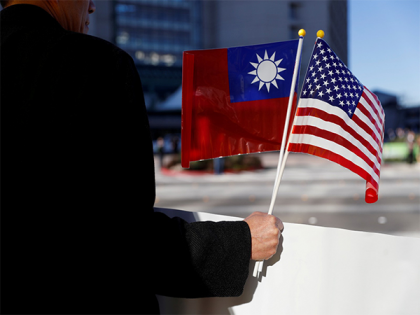US scholars warn growing Taiwanese distrust of Washington could bolster Beijing's influence
By ANI | Updated: August 20, 2025 14:20 IST2025-08-20T14:13:05+5:302025-08-20T14:20:08+5:30
Taipei [Taiwan] August 20 : Scholars in the US have expressed concerns that Taiwan's increasing distrust of the United ...

US scholars warn growing Taiwanese distrust of Washington could bolster Beijing's influence
Taipei [Taiwan] August 20 : Scholars in the US have expressed concerns that Taiwan's increasing distrust of the United States, particularly regarding President Donald Trump's tariffs and semiconductor policies, may negatively impact Washington's long-term interests while benefiting Beijing, as reported by the Central News Agency (CNA).
Bonnie Glaser and Jennifer Lan of the German Marshall Fund, a think tank based in the US, noted that though Taiwanese citizens have historically supported the United States, this positive sentiment is rapidly diminishing. They referenced recent public opinion polls from both American and Taiwanese sources, indicating that Taiwanese people have developed feelings of "distrust and scepticism" towards Washington in recent months.
One particular survey mentioned was a Brookings Institution report from April 2025, which revealed that 40.5 per cent of Taiwanese respondents viewed the United States negatively, a significant increase from 24.2 per cent in July 2024. The authors stated that this increasing scepticism towards the US is partly driven by the Taiwan Semiconductor Manufacturing Company's (TSMC) decision to expand its manufacturing operations in the US in alignment with Trump's America First policy, which many in Taiwan perceive as a potential dilution of Taiwan's strategic significance, as reported by CNA.
They also highlighted that Trump's tariffs on Taiwan are adversely impacting the U.S. image. "If this shift in public sentiment continues or worsens, it could hinder US interests," the scholars cautioned. "The growing anxiety might lead to hopelessness regarding Taiwan's future, thus providing the PRC [People's Republic of China] an opportunity to pursue its ongoing strategy of persuading Taiwanese citizens that unification with Beijing's terms is their best and perhaps only choice.
"The discontent could also encourage the PRC to take bolder actions aimed at enforcing unification, such as contesting Taiwan's authority over adjacent waters, implementing a quarantine or blockade, or capturing one of Taiwan's peripheral islands," the authors indicated.
To address the rising scepticism in Taiwan, Glaser and Lan proposed that Trump should make a statement emphasising that Taiwan is significant to the United States. They also suggested that Washington consider approving and ensuring the timely provision of asymmetric weaponry to Taiwan, potentially through presidential drawdown authority and foreign military financing. Additionally, they expressed that the White House should "facilitate, rather than obstruct, transits of Taiwan's presidents through the United States," and that Congress could accelerate the approval of a tax agreement to eliminate investment barriers, as highlighted by the authors, according to CNA.
Taiwan's Ministry of Foreign Affairs (MOFA) indicated that both Taipei and Washington are closely monitoring discussions within Taiwanese society regarding the narratives of "US scepticism." The two governments are working to thwart the potential exploitation of this "scepticism" by "malicious actors" aiming to initiate cognitive warfare against Taiwan, according to a press statement from MOFA. "Taiwan also looks forward to ongoing collaboration with the US in security, economic, and trade domains to exemplify the strong bilateral partnership," the ministry conveyed, as cited by CNA.
Disclaimer: This post has been auto-published from an agency feed without any modifications to the text and has not been reviewed by an editor
Open in app